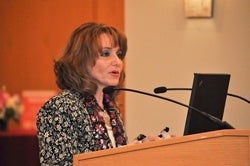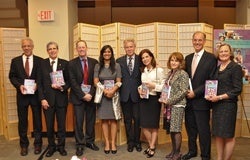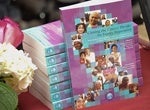October 2, 2012 — A young Rwandan girl named Claudine is one of the lucky ones. In 2005, after months of seeking a diagnosis for leg pain, she was introduced to a physician from Boston-based Partners In Health (PIH) who diagnosed her with an aggressive cancer in her leg. The nonprofit arranged for her to be flown to Massachusetts General Hospital where her leg was amputated. A year later she returned to Rwanda, determined to help others with cancer as a doctor or nurse when she grows up.
Claudine was fortunate not to become one of the estimated 4 million people whose lives are claimed by cancer annually in low- and middle-income countries. People with cancer who live in developing countries tend to have a much poorer prognosis than those living in wealthier nations due, in part, to delayed diagnosis, lack of access to proper treatment, and lack of education about the disease and its symptoms, resulting in the cancer divide. For instance, 90% of children diagnosed with a leukemia in wealthy countries such as Canada can hope to survive. For children living in one of the world’s 25 poorest countries, the chance of survival drops to only 10%*.
Perhaps the most heinous aspect of the cancer divide is the lack of access to pain control. In poorer nations millions of people with advanced or untreatable cancer, and other terminal illness, lack access to palliative care and suffer and die with preventable pain.
Cancer is also a huge financial burden on families. Surviving family members often are left impoverished after struggling to pay for even basic care.

These are some of the alarming issues that motivated Felicia Marie Knaul, director of the Harvard Global Equity Initiative (HGEI), and associate professor at Harvard Medical School (HMS), and colleagues to produce a new book, Closing the Cancer Divide: An Equity Imperative. Knaul and several of her co-editors were on hand for the book launch on September 11, 2012, which was held in Harvard School of Public Health’s (HSPH) Kresge Cafeteria.
“We are here precisely because this is an equity imperative and something that many of us are sure we can do something to change. The cancer divide is shocking and through collaborative and dedicated efforts it can be significantly reduced,” said Knaul, who serves as the co-director of the secretariat of the GTF.CCC, a group that she helped to found alongside [[Julio Frenk]], Dean of HSPH. The GTF.CCC is a collaboration among leaders from the global health and cancer care communities worldwide, originally convened by Harvard University through HSPH, HGEI, HMS, and Dana-Farber Cancer Institute (DFCI).
Closing the Cancer Divide, published by HGEI and distributed by Harvard University Press, summarizes the results of years of research, meetings, conferences, and projects of the GTF.CCC. Each of the book’s chapters provide evidence-based recommendations for developing programs, contributing to local and global policy making, and prioritizing research to expand cancer care in the developing world. The cases and frameworks provide a guide for developing responses to the challenge of cancer and other chronic illnesses and include contributions from civil society, global and national policymakers, patients and practitioners, and academics representing an array of fields.
“The book is a culmination of a very long journey. It feels incredibly gratifying to hold the book, smell the ink, and look at the words in print,” Dean Julio Frenk, GTF.CCC co-chair, said in his welcome remarks. “As we remember today the tragic events of 9/11, it offers an opportunity to reaffirm our commitment to building a more secure world through the reduction of the gaps in health that so much divide our world,” Frenk said.
Remembering Amanda Berger
Frenk and each of the speakers also paid tribute to the enthusiasm and spirit of the late Amanda J. Berger, to whom the book is dedicated. Berger was a research assistant at HGEI and HMS until her untimely death on April 14, 2012. She pursued a master’s degree at the London School of Hygiene and Tropical Medicine while helping with the book and other HGEI projects. Her mother, Marla Shapiro, professor of family and community medicine at the University of Toronto and a TV journalist, was among many of Amanda’s friends and family at the event. She thanked the audience for acknowledging her daughter’s contributions and for “lighting a fire” in Amanda to want to right health inequities in the world. A fund has been established in Amanda’s name at HMS.
Partnership is critical

“If there is one central theme here today, it is partnership,” said co-author Paul Farmer, Kolokotrones University Professor and Chair, Department of Global Health and Social Medicine at HMS, United Nations Special Deputy in Haiti, and a founding director of PIH. To combat what he called the “two pathologies”— cancer and extreme poverty—Farmer said it is important to be open to a range of partnerships. These include civil society organizations, foundations, and even support from celebrities and sports figures.
Other speakers included Rifat Atun, one of the book’s co-editors and professor of international health management at Imperial College London; Julie Gralow, also a co-editor of the book, co-secretariat of GTF.CCC and professor at University of Washington School of Medicine; and Lawrence Shulman, senior vice president for medical affairs at DFCI and previously GTF.CCC co-chair.
“This book represents the cooperation of many people who want to make a difference for individuals who have not had options for care. It was this vision— and iron will— that made this book happen,” Shulman said. “We are making progress but there’s a long way to go.”
* Source: Knaul FM, Gralow JR, Atun R, Bhadelia A (Eds). Closing the Cancer Divide: An Equity Imperative. Based on the work of the Global Task Force on Expanded Access to Cancer Care and Control in Developing Countries. Cambridge, MA: Harvard Global Equity Initiative, 2012. Distributed by Harvard University Press.
Learn more
Global Health Leaders Advocate for Expanding Cancer Care in Developing Countries (HSPH press release)
“The Shadow Epidemic” by Julio Frenk. Harvard Public Health Review, Fall 2009
Efforts to Fight Cancer in the Developing World Highlighted in Special Issue of Science Magazine
